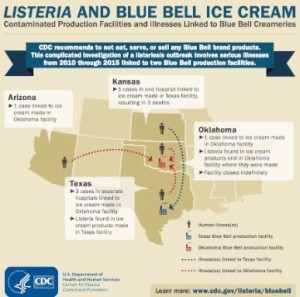 The nation’s first Blue Bell ice cream Listeria lawsuit filed in U.S. District Court in Texas includes details of similarity between a retirement home director in Houston who nearly died of Listeria meningitis and a cluster of five people in Wichita who were striken by listeriosis after eating Blue Bell ice cream while at Via Christi Hospital. All six individuals ate single-serve ice cream products purchased from Blue Bell Creameries Inc. through institutional, or food service, channels.
The nation’s first Blue Bell ice cream Listeria lawsuit filed in U.S. District Court in Texas includes details of similarity between a retirement home director in Houston who nearly died of Listeria meningitis and a cluster of five people in Wichita who were striken by listeriosis after eating Blue Bell ice cream while at Via Christi Hospital. All six individuals ate single-serve ice cream products purchased from Blue Bell Creameries Inc. through institutional, or food service, channels.
According to a copy of the lawsuit filed by Pritzker Hageman attorneys on behalf of David Philip Shockley, he repeatedly ate single-serve Blue Bell ice cream products while on the job at a 462-apartment continuing care retirement community in Houston. The 31-year-old man with a masters degree in public policy with a focus on aging was the facility’s associate executive director and nursing facility administrator. He became so infected by Listeria monocytogenes bacteria that it entered his bloodstream and caused him to collapse with a body temperature of 106 degrees. He lost consciousness for more than five days, survived extensive hospitalization that included tube feeding, and now remains permanently disabled while facing medical bills approaching $500,000.
The complaint recounts how a single-serve Blue Bell ice cream product known as “Scoops” was served to all five Via Christi case patients from January 2014 to January 2015. An investigation of their Listeria cases by the Centers for Disease Control and Prevention (CDC) identified “Scoops” as the common food source among the sickened patients and the agency ultimately concluded that all five listeriosis patients from Via Christi contracted their infections as a result of consuming contaminated Blue Bell ice cream. Three of those patients at Via Christi St. Francis Hospital in Wichita died.
Bolstering the CDC’s finding were tests of Blue Bell ice cream samples by state health investigators in Texas and South Carolina. The Texas Department of State Health Services collected product samples from the Blue Bell production facility in Brenham and found Listeria monocytogenes bacteria in two of the same type of single-serve products that tested postive in South Carolina. In addition, the Texas probe found the pathogen in “Scoops,” which was made on the same production line.
Mr. Shockley’s onset of listeriosis happened in 2013 and the FDA has itemized an array of Blue Bell’s internal testing results showing extensive Listeria contamination in the company’s manufacturing facilities from early 2013 to early 2015. FDA inspectors also recorded 26 conditions constituting violations of federal law and posing significant risks to the safety of Blue Bell products.




